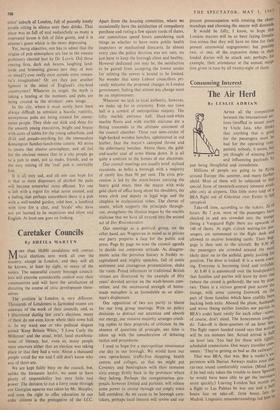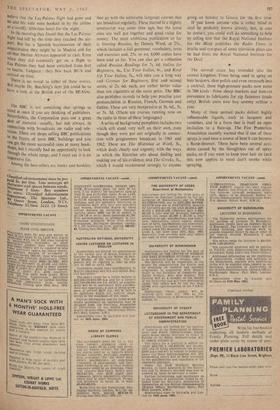Consuming Interest
The Air Herd
By LESLIE ADRIAN
AFTER all the competition between the international air- lines (muffled in recent years by Uncle lata, who thinks that anything that is good for the passengers must be bad for the operating cony panies), nobody, it seems, has Millions of people are going to be Hying around Europe this summer, and many farther' afield. Most of them will be subjected to that special form of twentieth-century torment avail- able only at airports. This little story told of a BEA flight out of Gibraltar over Easter is not' untypical. Take-off time, according to the tickets, 20.10 hours. By 7 p.m. most of the passengers have checked in and are crowded into the lounge (being a Vanguard flight there are upwards of 140 of them). At eight o'clock waiting-list Pas' sengers are summoned to the flight desk and allowed to receive boarding cards. Their bag" gage is then sent to the aircraft. By 8.30 all the passengers are crowded around the most likely door on to the airfield, gently jostling for position. The door is locked. It is a warm everl- ing. Everyone is becoming tired and irritable, At 8.40 it is announced over the loudspeakers- that families and parties will leave by door one (where the crowd is gathered); the rest by door two. There is a vicious general post across the lounge, with some cunning footwork on the part of those families which have craftily been backing both exits. Aboard the plane, husbands and wives (being neither families nor parties in BEA's code) hunt vainly for each other—some, of course, don't mind. The honeymoon couples do. Take-off is three-quarters of an hour late. The flight report handed round says that arrival- will be ten minutes late. Actual arrival is half an hour late. Too bad for those with tightly scheduled connections. One weary traveller corn: ments: 'They're getting as bad as the railways!
That was BEA, that was. But a reader's ex" periences with Iberian Airways makes even that rat-race sound comfortably routine. (Mind you, if he had only taken the trouble to learn Spanish' he would have been able to get the messages more quickly.) Leaving London last month on flight to Las Palmas he was one and a half hours late on take-off; three hours late 111 Madrid. Linguistic misunderstandings led him to believe that the Las Palmas flight had gone and he and his wife were booked. in by the airline at- a sernify, fifth-rate hotel for the night. ' In the morning they found that the Las Palmas flight had left by the time they reached the air- 139rt. But for a Spanish businessman of their acquaintance they might be hi Madrid still for all-that Iberian Airways appeared to care. Even When they did eventually get on a flight to Eas Palmas they had been switched from first to tourist. Tailpiece : they flew back BUA and arrived on time. There is no moral to either of these stories. But maybe Dr. Beeching's next job could be -to have a look at the I3ritish end of the BEAfine.
* The BBC is not something that springs to mind at once if you are thinking of publishers. Nevertheless, the Corporation puts out a great deal of material—usually, but not always, in connection with broadcasts on radio and tele- vision. There are shops selling BBC publications in the foyers of most BBC buildings and you Can get the more successful ones at many book- shops, but 1 recently had an opportunity to look through the whole range, and I must say it is an imPressive list.
Among the best-sellers are books and booklets that go with the admirable language courses that are broadcast regularly. These started in a slightly amateurish way some time ago, but the latest ones are well put together and good value for money. The most ambitious publication so far is Starting Russian, by Dennis Ward, at 25s., which includes a full grammar, vocabulary, texts and exercises and, 25s. or no, 8,000 copies have been sold so far. You can also get a collection called Russian Readings for 7s. 6d. Italian for Beginners, 4s., Use Your Italian, 6s., and Keep Up Your Italian, 5$., will take you a long way and German for Beginners, first and second series, at 2s. 6d. each, are rather better value than ten cigarettes at the same price. The BBC also publishes records to help you practise your pronunciation in Russian, French, German and Italian. These are very inexpensive at 3s. 6d.,,5s. or 5s. 3d. (There are courses running now on the radio in three of these languages.) A series of background pamphlets includes two which still stand very well on their own, even though they were put out originally in connec- tion with programmes broadcast in 1961 and 1962. These' are The Historian at Work, 5s,, which deals clearly and cogently with the ways in which the historian sets about finding and making use of his evidence, and The Greeks, 5s., which I. would recommend strongly to anyone going on holiday to Greece for the first time, If you know anyone who is either blind • or deaf he probably knows already, but, hi case he doesn't, you could well do something to help by telling him that the Royal National Institute for the Blind publishes the Radio Times in braille and synopses of some television plays can be had from the Royal National Institute for the Deaf.
* The aerosol craze has extended into the animal kingdom, From being used to spray on hair lacquers, shoe polish and even vermouth into a cocktail, these high-pressure packs now come in 700 kinds—from sheep markers and foot-rot preventers to lubricants for zip fasteners (trade only). British users now buy seventy million a year.
Many of these aerosol packs deliver highly inflammable liquids, such as lacquers and varnishes, and in a form that is itself an open invitation to a flare-up. The Fire Protection ASsociation recently warned that if one of these sprays is used near a source of heat it can become a flame-thrower. There have been several acci- dents caused by the thoughtless use of spray packs, so if you want to keep your hair on (and this now applies to men) don't smoke while spraying.







































 Previous page
Previous page